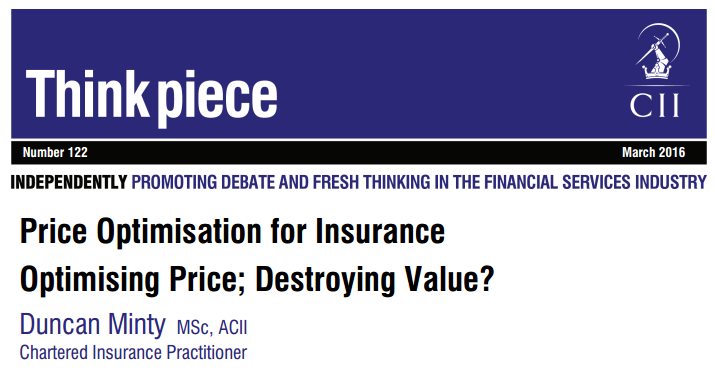The Chartered Insurance Institute has recently published a paper I wrote about the implications of price optimisation for the UK personal lines market. In the paper, I explore four things:

- the background to the emergence of price optimisation;
- the arguments for and against its use;
- developments by regulators both in the UK and the US;
- ten questions that a UK insurer should be asking itself about how its adopting price optimisation.
And as so often happens in life, just as the paper went to print, an 11th question emerged, triggered by a paper from the Dutch researcher Frederik Zuiderveen Borgesius titled “Online Price Discrimination and Data Protection Law”.
In his paper, Borgesius looks at first degree price optimisation, being when each customer pays a personalised price. He concludes that price optimisation involves the processing of personal data and as such, is subject to data protection law. As a result, this would require a firm to inform its customer of the purpose for which their data is being processed. In other words, tell them you’re optimising the price you’re selling to them at.
The obvious question arising from Borgesius’s paper is… why isn’t this happening already? Data protection legislation is well established in the UK, so either insurers have been ignoring it (which I tend to doubt), or treating processes such as informing and obtaining consent in very generic terms (more likely I think). Yet how sustainable is this, given that EU law on data protection will soon be tightened up? Insurers’ consent processes could soon be subject to more rigorous scrutiny.
I’m mindful of three convergences happening in the UK insurance market at the moment. As just mentioned, there will be preparations underway for the new EU data protection law. Then there is the Information Commissioners’ warning last year to insurers to remember that ‘big data is not a game played by different rules’. And finally, there’s the FCA’s current study into the use of big data in general insurance. Might there emerge out of this a regulatory signal to the market that price optimisation needs to be specifically flagged with consumers? It’s just the sort of soft regulatory intervention that this Government prefers: a mix of transparency and ‘let the customer decide’.
There’s an argument that price optimisation is less of an issue because it’s not being used that much: the tools are in place, but not switched on yet. If that’s the case, then there’s an amazing amount of investment going to waste. It’s more likely an indication that insurers are working in two modes: a learning mode, in which they experiment with the sensitivity of certain pricing decisions, and a cleansing mode, in which they manoeuvre certain types of risk marginal to their strategies off their books. The latter has implications of course for vulnerable consumers: how many insurers undertook a vulnerability analysis before entering that cleansing mode. Not many I suspect.
Insurers like this one are not going to invest in price optimisation unless they’re going to earn a good return from it, so the issues raised in this post and in my paper for the CII are not ones for tomorrow. They’re ones for executives to get to grips with today.

